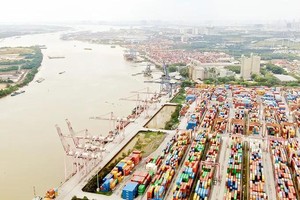 |
Illustrative photo |
However now the State Bank of Vietnam has decided to increase credit by 1.5 percent to 2 percent for all credit institutions. This will be effective immediately even though only three more weeks remain for this year.
Loans still difficult
Last week, Prime Minister Pham Minh Chinh signed an Official Dispatch 1156/CD-TTg on credit capital supply for the economy. The dispatch requested the State Bank of Vietnam to take timely and effective measures to direct credit institutions to accelerate the pace of implementation of the interest rate support program from the state budget according to Decree No. 31/2022/ND-CP of the Government. This move will actively reduce lending interest rates. At the same time, credit must receive priority which is the driving force of economic growth for consumption, investment, exports, construction of industrial parks, social housing, and housing for workers.
The news of the expansion of credit limit is good news for the market which has long faced difficulty in accessing capital. However, at a seminar held on December 13, eight days after the State Bank of Vietnam announced the loosening of the credit limit, Mr. Truong Tien Dung, Standing Vice Chairman of the HCMC Food Association shared that the Prime Minister has directed the State Bank of Vietnam to quickly supply the capital to the economy, which is a good sign.
However, he believes that from policy implementation to actual practice there should be no delay and enterprises hope that commercial banks will soon open credit rooms so that businesses can access capital more easily to overcome difficulties. Because access to capital has not been easy for a long time, many production and business enterprises still have not been able to access capital even though the State Bank of Vietnam has loosened the credit room.
Dr. Pham Chi Quang, Director of the Monetary Policy Department under the State Bank of Vietnam, said that it is very challenging for the banking system to supply the economy with about VND300,000 bln because the capital needs of businesses and the economy are very large, but credit institutions are also enterprises. They lend on loan terms and conditions and cannot lower the standard for lending to businesses that are losing money.
The money they lend out is actually coming from the people. All enterprises must have a healthy financial capacity to access capital. Mr. Quang also admitted that in this context, commercial banks also have to find and support good businesses. Before there was a lack of credit room, so many businesses could not access capital, but now even though there is credit room, the door is not fully open to all businesses.
Capital mobilization
In December interest rates continued to increase. This was caused by the same old problem of the growth of capital mobilization not keeping pace with the development of the credit market. On the one hand, banks have to find ways to attract capital to balance the ratio between credit balance and mobilize the capital of banks. On the other hand, from October 2022, banks also had to reduce the use of short-term capital for medium- and long-term loans to 34 percent, so it is necessary to promote medium- and long-term capital mobilization with high-interest rates.
The State Bank of Vietnam has requested that from December 12, commercial banks must report deposit and lending interest rates of new transactions in their weekly report. This clearly is meant to control the interest rate increase in banks. But in the market, the public listed interest rate and the implicit agreed interest rate do not coincide.
On December 14, a bank sent a separate interest rate chart to customers with a six-month deposit interest rate for a deposit of VND300 mln at 10.1 percent per year, from VND1 bln at 10.5 percent per year, from VND3 bln at 10.9 percent per year, and from VND10 bln at 11 percent per year. According to the interest rate chart listed on the website, the highest deposit interest rate is only 9.2 percent per year. So, it is possible to imagine that the lending interest rate will not be smooth as announced by the banking industry.
For the five priority areas, the State Bank of Vietnam has a ceiling on lending interest rate under the direction of the Government, which means that these enterprises can access capital at interest rates lower than market rates. However, in order to be granted credit, an enterprise must meet all conditions and the bank approval criteria. At this time, if enterprises in the manufacturing sector come to the bank and are refused loans, it will not be strange. Because banks are required to improve credit quality, while domestic enterprises are currently pressured by many difficulties. Therefore, the Government support package of VND40,000 bln to support businesses to recover after the Covid-19 pandemic has been slow to implement.
On the other hand, businesses always need capital, but now they have either finished preparing or nearly finished the supply of Tet goods for domestic use. Export orders have also decreased, and the bank suspension of a high-interest rate is also a problem. In this scenario, the current policy of directing credit to production is not necessarily feasible and optimistic.
Despite all setbacks, there are still two types of factions that are in dire need of capital and will accept paying the high interest rate. These are real estate businesses or individual real estate investors who desperately need capital to bail out even though the interest rate is high.
The tightening of real estate credit plus fluctuation in the corporate bonds market occurred at the same time in recent years, pushing real estate businesses into a state of severe capital famine. Even the HCMC Real Estate Association says that some real estate corporations and businesses have had to borrow capital from society at very high interest rates, hence investors are rushing to sell real estate for cutting losses and under pressure to repay banks.
























